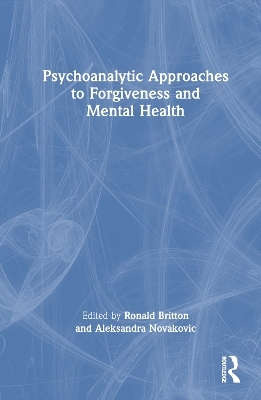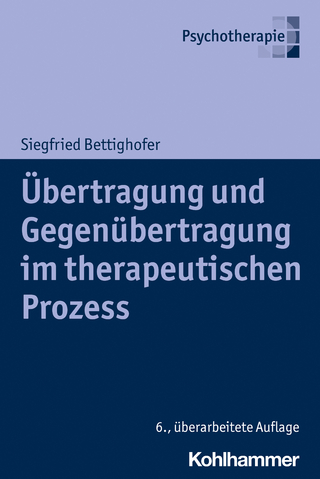
Psychoanalytic Approaches to Forgiveness and Mental Health
Routledge (Verlag)
978-1-032-42794-2 (ISBN)
Psychoanalytic Approaches to Forgiveness and Mental Health considers the role of forgiveness in mental life, concerning both forgiving and being forgiven.
Each chapter addresses concepts including superego, repetition compulsion, enactment, and notions such as sacrifice, penance, justification, absolution, and contrition. The contributors consider both their professional and clinical experience and their ethical, cultural, or philosophical background when considering aspects of forgiveness and its impact on clinical practice. The book is an attempt to open the subject of forgiveness, not to reach ethical conclusions nor to formulate pious psychological behavioural axioms. It also considers the weight of feeling unforgiven and of holding the lifelong resentment or vengeful wishes of the unforgiving.
Psychoanalytic Approaches to Forgiveness and Mental Health will be key reading for psychoanalysts and psychotherapists in practice and in training and for other professionals interested in the role of forgiveness in mental life. It will also be of interest to academics and students of psychoanalytic studies, philosophy and spirituality.
Ronald Britton is a training and supervising analyst with the British Psychoanalytical Society. He first trained as a doctor, and as a child psychiatrist; he was chair of the Department of Children and Parents at the Tavistock Clinic, where he was involved in treatment of deprived children and their parents. This experience was influential to his psychoanalytic thinking where he maintains the importance of ‘childhood’ as a formative experience. Aleksandra Novakovic is a training and supervising analyst of the British Psychoanalytic Association and a group analyst. She was consultant clinical psychologist, joint head of the Inpatient & Community Psychology Service, and she worked with patients with severe mental health problems and facilitated staff groups for mental health teams. She worked at Tavistock Relationships and supervised on the Reflective Practice Course at IGA.
Acknowledgements
About the Editors and Contributors
Introduction
Chapter 1: The lost good object regained: Coexisting pars of self and the generosity of forgiveness, Aleksandra Novakovic
Chapter 2: Forgiving as malice relented: the depressive position in action, Chris Mawson
Chapter 3: The developmental importance of forgiveness and compassion: In psychoanalysis and Buddhism, Hiroshi Amino
Chapter 4: Revenge or Forgiveness: the Oresteia, Ronald Britton
Chapter 5: Cry Havoc and Reconciliation, David Millar
Chapter 6: Revenge And Resentment In The ‘Oedipus Situation’, John Steiner
Chapter 7: She waited, Kate Croy… Forgiveness in Henry James’ "The Wings of the Dove": the Villain’s Tragedy, Ignês Sodré
Chapter 8: Contessa perdono! Mozartian sexual betrayal and forgiveness, Francis Grier
Chapter 9: Forgiveness Work in Society, Institutions and Large Groups, Gerhard Wilke
Chapter 10: Forgiveness in the Recognition of Actuality, Karl Figlio
Chapter 11: In the grip of un-forgiveness : Some notes on forgiveness and orientation from a German background, Claudia Frank
Chapter 12: The Unforgiving Self, Ronald Britton
| Erscheinungsdatum | 22.08.2023 |
|---|---|
| Verlagsort | London |
| Sprache | englisch |
| Maße | 156 x 234 mm |
| Gewicht | 453 g |
| Themenwelt | Geisteswissenschaften ► Psychologie ► Psychoanalyse / Tiefenpsychologie |
| Medizin / Pharmazie ► Medizinische Fachgebiete ► Psychiatrie / Psychotherapie | |
| Sozialwissenschaften ► Soziologie | |
| ISBN-10 | 1-032-42794-9 / 1032427949 |
| ISBN-13 | 978-1-032-42794-2 / 9781032427942 |
| Zustand | Neuware |
| Informationen gemäß Produktsicherheitsverordnung (GPSR) | |
| Haben Sie eine Frage zum Produkt? |
aus dem Bereich


